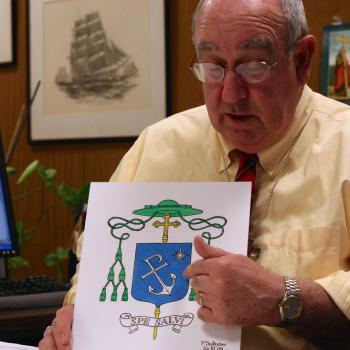As I noted yesterday, I spent the weekend down south, for a family wedding in Virginia.
It was my wife’s sister, and it was her second marriage. I went there with a lot of complicated and conflicted feelings; I’d attended her first wedding, nearly 30 years ago, celebrated at a Catholic church in Maryland and made complete by a nuptial mass. This one was very different: a civil ceremony (presided over by guy who was both a former Franciscan and ex-Christian Brother) in the garden adjoining a town hall. There was no religion, to speak of — the only mention of God that I can recall occurred at our table, when someone asked me to say grace — and the event was generally low key. It’s my prayerful hope that both the bride and groom will one day receive annulments, so that their marriage can be convalidated in a Catholic church.
Speaking of which: the wife of a deacon sent me a link today to her blog, which has her husband’s homily from a recent convalidation ceremony. She noted that I’d never posted on this important topic, and thought it worth mentioning.
She’s right, so here’s an excerpt:
I can speak to you about the meaning and importance of a sacramental marriage not just because it is something that the Church teaches. My wife Kathy and I were also married first in a civil ceremony, and it was not until many years later that we sought convalidation of our marriage.
With that convalidation came all of the graces that accompany the Sacrament of Holy Matrimony, and I can assure you that there can be no comparison between our first and our second marriages. Our understanding of marriage – and our marriage itself – were fundamentally changed as we came to see and live our marriage according to the teachings of our Faith. So I believe it is really important today to consider the meaning of love and marriage as they have been revealed in Sacred Scripture.
It was in the first book of the Bible, the Book of Genesis, that the institution of marriage was introduced. There, in the story of creation, we see God’s plan for the man he created. “It is not good for man to be alone,” the Lord God says. “I will make a suitable partner for him.” And God creates the first woman.
We learn from the Book of Genesis that man is created as a social being. By nature, he needs to be with someone – the woman with whom he will spend his entire life. Today’s Gospel echoes that message: “God made them male and female,” Jesus teaches in the Gospel of Mark. “And for this reason, a man shall leave his father and his mother and be joined to his wife.”
This desire to be together is so strong and so natural, Genesis tell us, that man “will cling to his wife and the two of them will become one body.”
Again, the Gospel echoes this message: “And the two shall become one flesh,”Jesus tells us. “So they are no longer two, but one flesh.” The unity of marriage is so strong and so important that two separate, distinct individuals become a new entity in marriage, a new and unified creation in its own right. Eric and Alissa will become one in marriage before God today.
Some think of marriage as a 50/50 proposition. It is not. A truly successful marriage calls on each partner to give 100% to this new entity, this new creation where the two become one. It is a union of two persons who have been joined together by God, which is why Jesus
reminds us that “What God has joined together, no man must separate.”So, permanence is a vital characteristic of the relationship described in the Gospel of Mark. Also vital to the marital relationship is love – the kind of love that puts the other person first. Paul spoke of the necessity of Christian love in his letter to the Corinthians which we heard just a few minutes ago. Whatever else I may have, Paul said, if I do not have love, I am nothing.
Read it all. There’s wisdom there for all married couples.












